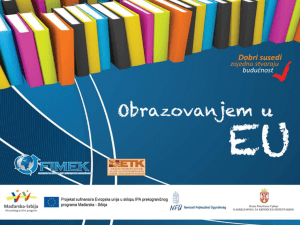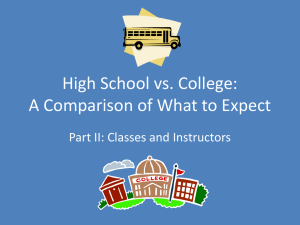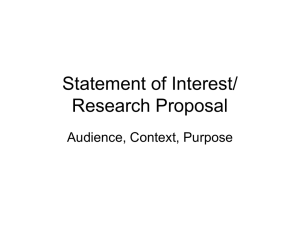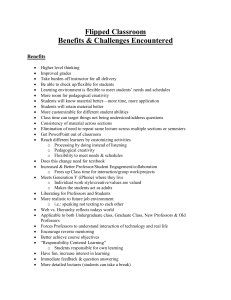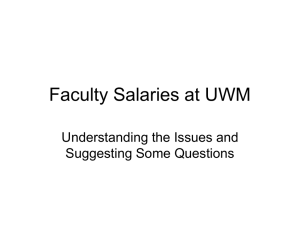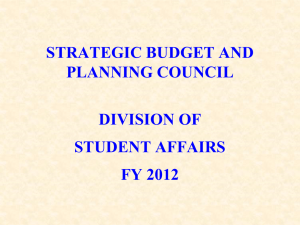National Cheng Kung University Guidelines for Teacher Evaluation
advertisement
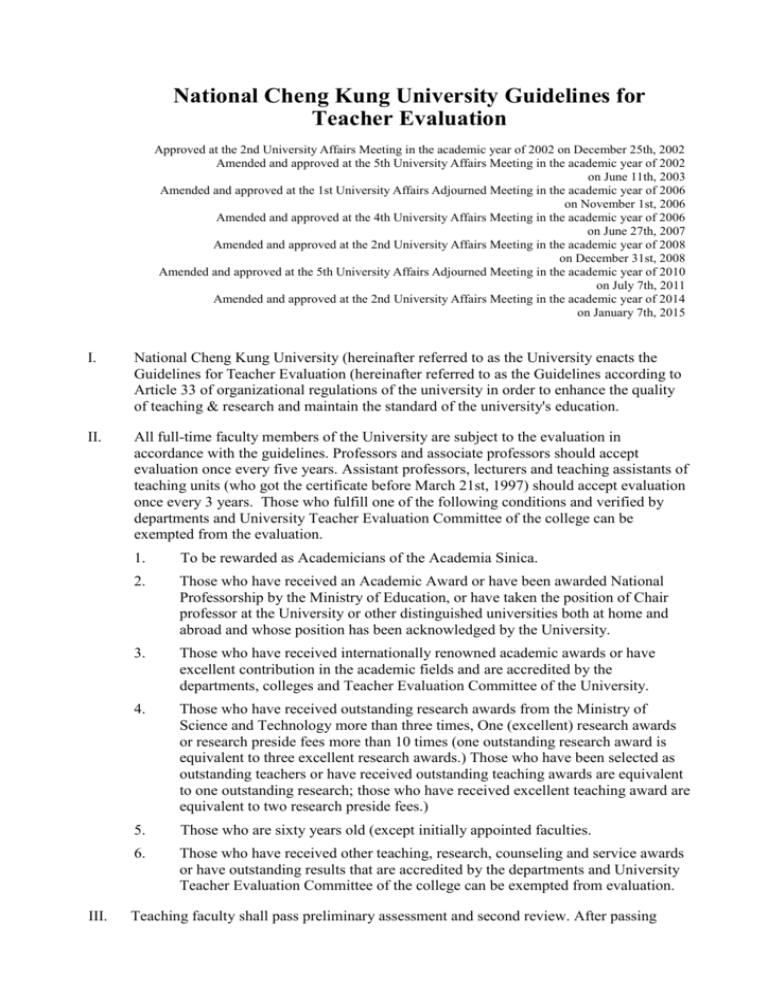
National Cheng Kung University Guidelines for Teacher Evaluation Approved at the 2nd University Affairs Meeting in the academic year of 2002 on December 25th, 2002 Amended and approved at the 5th University Affairs Meeting in the academic year of 2002 on June 11th, 2003 Amended and approved at the 1st University Affairs Adjourned Meeting in the academic year of 2006 on November 1st, 2006 Amended and approved at the 4th University Affairs Meeting in the academic year of 2006 on June 27th, 2007 Amended and approved at the 2nd University Affairs Meeting in the academic year of 2008 on December 31st, 2008 Amended and approved at the 5th University Affairs Adjourned Meeting in the academic year of 2010 on July 7th, 2011 Amended and approved at the 2nd University Affairs Meeting in the academic year of 2014 on January 7th, 2015 I. National Cheng Kung University (hereinafter referred to as the University enacts the Guidelines for Teacher Evaluation (hereinafter referred to as the Guidelines according to Article 33 of organizational regulations of the university in order to enhance the quality of teaching & research and maintain the standard of the university's education. II. All full-time faculty members of the University are subject to the evaluation in accordance with the guidelines. Professors and associate professors should accept evaluation once every five years. Assistant professors, lecturers and teaching assistants of teaching units (who got the certificate before March 21st, 1997) should accept evaluation once every 3 years. Those who fulfill one of the following conditions and verified by departments and University Teacher Evaluation Committee of the college can be exempted from the evaluation. III. 1. To be rewarded as Academicians of the Academia Sinica. 2. Those who have received an Academic Award or have been awarded National Professorship by the Ministry of Education, or have taken the position of Chair professor at the University or other distinguished universities both at home and abroad and whose position has been acknowledged by the University. 3. Those who have received internationally renowned academic awards or have excellent contribution in the academic fields and are accredited by the departments, colleges and Teacher Evaluation Committee of the University. 4. Those who have received outstanding research awards from the Ministry of Science and Technology more than three times, One (excellent) research awards or research preside fees more than 10 times (one outstanding research award is equivalent to three excellent research awards.) Those who have been selected as outstanding teachers or have received outstanding teaching awards are equivalent to one outstanding research; those who have received excellent teaching award are equivalent to two research preside fees.) 5. Those who are sixty years old (except initially appointed faculties. 6. Those who have received other teaching, research, counseling and service awards or have outstanding results that are accredited by the departments and University Teacher Evaluation Committee of the college can be exempted from evaluation. Teaching faculty shall pass preliminary assessment and second review. After passing the preliminary assessment, the teaching faculty can start to proceed to the second review. The preliminary assessment is conducted by the department (institute) teacher evaluation committee. The second review should be conducted by the college teacher evaluation committee. IV. Faculty evaluation should be processed objectively and comprehensively according to the faculty’s teaching, research, guidance and service. Faculty members should be acknowledged in case of outstanding performance in any areas of teaching, research, guidance and service. Every department or college should enact the guidelines for teacher evaluation separately, including assessments items, standards and procedures. These guidelines should be verified by the Teachers’ Appraisal Committee and then can start to execute. If departments or colleges have stricter regulations, they should follow their regulations. For teaching assistants of academic units who received certificate before March 21st, 1997, their evaluation standards will be enacted by Office of Academic Affairs and Office of Personnel Services and then start to execute after submitting to the Teachers’ Appraisal Committee. Every department or college should enact their own assessment items, standards and procedures and then start to execute them after submitting to the Teachers’ Appraisal Committee. V. Newly-appointed professors and associate professors who pass the renewed employment will be deemed as passing the first assessment according to Article 5 of Regulations for Teacher Employment of the university. Newly-appointed assistant professors and lecturers do not need to go through the evaluation within the prescribed period according to Article 5 of Regulations for Teacher Employment of the university. Those who pass the promotion will be deemed as passing the first assessment. VI. The University's teachers who fail the evaluation cannot receive pay raises or apply for sabbatical leaves, secondments, part-time jobs or part-time teaching outside of the University as of next year. The teachers who fail the evaluation should be re-evaluated within two years. Those who pass the re-evaluation receive pay raises and apply for sabbatical leaves, transfers, part-time jobs and part-time teaching outside the University again as of next year. Employment of those who fail to undergo the re-evaluation within two years or still fail the re-evaluation will not be renewed. VII. Those who do not pass the recent evaluation cannot apply for the promotion; cannot apply for extended service; cannot be the committee member of any rank of the University Teacher Evaluation Committee. If they are the current committee members, their position will be replaced by alternate members. VIII. Faculty to be evaluated should provide related documents for receiving the evaluation. Anyone who fails to provide the documents will be deemed as failing the evaluation for the year. For a teacher who takes a leave with pay or without pay (e.g. research leave, transfer, giving lectures overseas or encountering severe incidents) and cannot present the required documents, the evaluation will be postponed until the teacher returns to the University. IX. From the day that these guidelines are passed and enforced, those who have been professors or associate professors for more than 5 years should take the first evaluation; those who have been assistant professors or lecturers for more than 3 years should take the first evaluation. Until July 31st, 2004, those who have been professors or associate professors for more than 5 years or those who have been assistant professors or lecturers for more than 3 years should apply for the first evaluation since the academic year of 2004. The calculation of the years for taking evaluation should not include unpaid leave (such as lecturing abroad or further studying, nursery, taking care parents and so on) and the period of maternity leave (which will be calculated as one year every time), but the secondment period will be calculated by half. If a faculty member has already received a promotion, the years in which the faculty member should receive an evaluation should commence from the relevant academic year subject to the faculty's job title after the promotion. Any doubt about the calculation of the evaluation years may be clarified by the Office of Personnel Services. X. If members of the Teacher Evaluation Committee are clients of the evaluation; they should avoid any resolution or discussion that is relevant to their assessments. Twothirds of all Committee members should be present at any meetings and then the meeting may start. Any resolution should be agreed upon by more than one-half of the present members. XI. Units of all department-level should complete the preliminary assessment before April 15th and submit to the college to proceed to the second review. Units of all college-level should complete second review before May 15th and submit to the Office of academic affairs for compiling and then announce the passing list after being approved by the President. XII. The preliminary assessment of teacher evaluation on employment of any teachers other than those of the department (institute) of college, Physical Education Office and 1stlevel center (division and library) should apply in accordance with the assessment on employment of department (institute). The second review on employment of teachers of the Center for Micro/Nano Science and Technology and Computer and Network Center should be conducted by the Teacher Evaluation Committees of College of Engineering and College of Electrical Engineering and Computer Science, while the second review on employment of the other teachers should be conducted by the Teacher Evaluation Committees other than the college Teacher Evaluation Committees. XIII. Those who are dissatisfied with the results of the preliminary assessment can submit a reapplication in writing to the Teachers’ Appraisal Committee of the college; those who are against the results of the second review can submit a reapplication in writing to the Teachers’ Appraisal Committee of the university. Faculty members who disagree with the re-appeal decision may file a complaint with the University's Teacher Appeal Review Board. XIV. Evaluation of full-time researchers in the establishment will apply in accordance with the evaluation of teaching faculties. XV. Matters that are not covered by the Guidelines should be implemented in accordance with the related regulations. XVI. These Guidelines should be enforced after passing the University's meeting of academic affairs. The same procedure should apply to the amendments to these Guidelines, if any.
